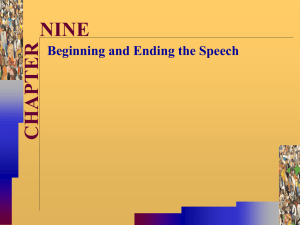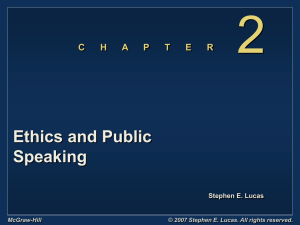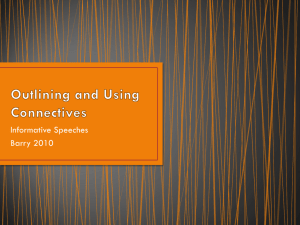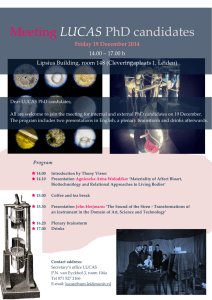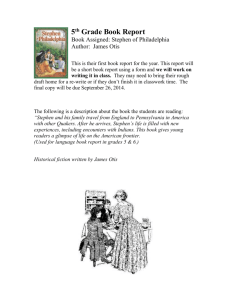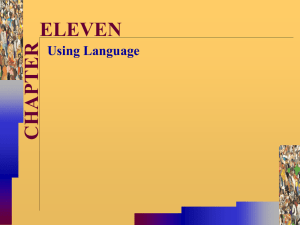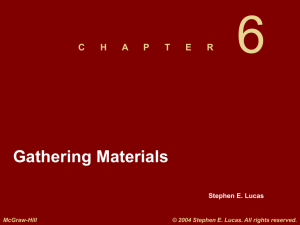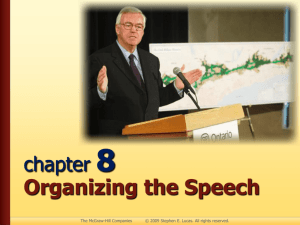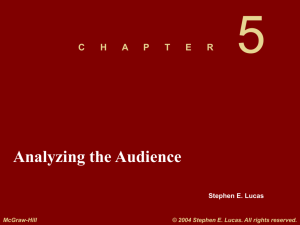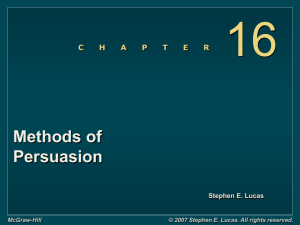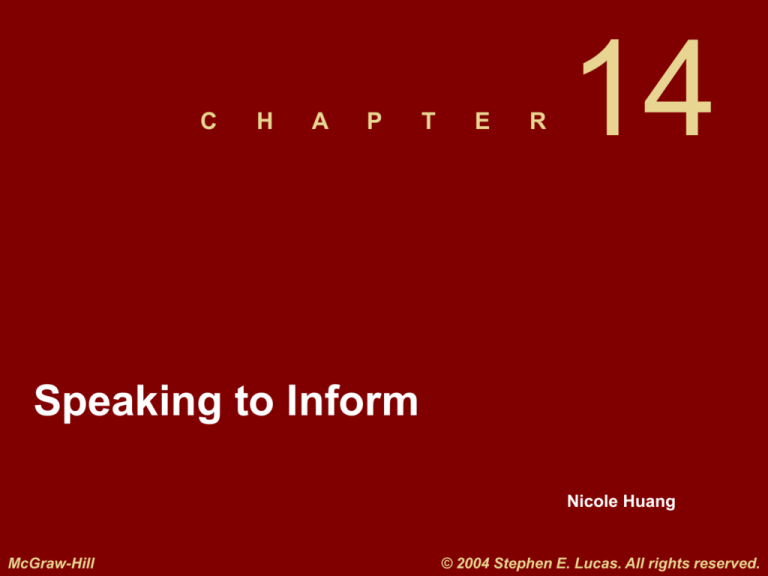
C
H
A
P
T
E
R
14
Speaking to Inform
Nicole Huang
McGraw-Hill
© 2004 Stephen E. Lucas. All rights reserved.
Slide 2
Informative Speech
A speech designed to convey
knowledge and understanding.
McGraw-Hill
© 2004 Stephen E. Lucas. All rights reserved.
Slide 3
Types of Informative
Speeches
•
•
•
•
McGraw-Hill
Speeches about objects
Speeches about processes
Speeches about events
Speeches about concepts
© 2004 Stephen E. Lucas. All rights reserved.
Slide 4
Objects
• Anything that is visible, tangible,
and stable in forms
• Examples:
subways, stock market, digital
cameras, pictures, places,
animals, structures, people
McGraw-Hill
© 2004 Stephen E. Lucas. All rights reserved.
Slide 5
Informative Speech
About an Object
Specific Purpose: To inform my audience of
the major alternative-fuel cars now being
developed.
I.
One kind of alternative-fuel car is
powered by electricity.
II.
A second kind of alternative-fuel car is
powered by methanol.
III. A third kind of alternative-fuel car is
powered by hydrogen.
McGraw-Hill
© 2004 Stephen E. Lucas. All rights reserved.
Slide 6
Process
• A systematic series of actions that
leads to a specific result or product
•
•
•
•
•
Examples:
How hurricans develop
How to write an effective job resume
How cell phone are made
How to perform Yoga
McGraw-Hill
© 2004 Stephen E. Lucas. All rights reserved.
Slide 7
Informative Speech
About a Process
Specific Purpose: To inform my audience
how a batik fabric is printed.
I.
The design is first sketched on the
paper.
II. A wax resist is applied to the fabric
wherever you don’t want the dye to
penetrate.
III. The fabric is then dipped in the dye.
IV. When the fabric is dried, the wax resist
is removed.
McGraw-Hill
© 2004 Stephen E. Lucas. All rights reserved.
Slide 8
Event
• Anything that happens or is
regarded as happening
• Examples:
• 228; 911; car accident; Trips to
Hong Kong
• Taiwan independent movement
McGraw-Hill
© 2004 Stephen E. Lucas. All rights reserved.
Slide 9
Informative Speech
About an Event
Specific Purpose: To inform my audience
about the events in women’s gymnastics.
I.
The floor exercise combines dancing,
acrobatics, and tumbling.
II. The vault features explosive strength
and dramatic midair maneuvers.
III. The balance beam requires precise
routines and perfect coordination.
IV. The uneven parallel bars demand great
strength, flexibility, and agility.
McGraw-Hill
© 2004 Stephen E. Lucas. All rights reserved.
Slide 10
Concept
• A belief, theory, idea, notion,
principle, or the like
• Examples:
• Confucianism; religious beliefs;
international law, communication
theory; TESOL teaching theory
McGraw-Hill
© 2004 Stephen E. Lucas. All rights reserved.
Slide 11
Informative Speech
About a Concept
Specific Purpose: To inform my audience
about the basic principles of Islam.
I.
Islam was founded by the prophet
Muhammad in the early 600s.
II. The teachings of Islam are written in the
Koran, the holy book of Islam.
III. Today Islam is divided into a number of
sects, the largest of which are the
Sunnis and the Shiites.
McGraw-Hill
© 2004 Stephen E. Lucas. All rights reserved.
Slide 12
Guidelines for Informative
Speaking
• Don’t overestimate what the audience
knows
• Relate the subject directly to the
audience
• Don’t be too technical
• Avoid abstractions
• Personalize your ideas
McGraw-Hill
© 2004 Stephen E. Lucas. All rights reserved.
Slide 13
Description
A statement that depicts a person,
event, idea, or the like with clarity
and vividness.
McGraw-Hill
© 2004 Stephen E. Lucas. All rights reserved.
Slide 14
Comparison
A statement of the similarities among
two or more people, events, ideas, etc.
McGraw-Hill
© 2004 Stephen E. Lucas. All rights reserved.
Slide 15
Contrast
A statement of the differences among
two or more people, events, ideas, etc.
McGraw-Hill
© 2004 Stephen E. Lucas. All rights reserved.
Slide 16
Explaining a Concept
McGraw-Hill
© 2004 Stephen E. Lucas. All rights reserved.
Slide 17
Explaining Complex Ideas
McGraw-Hill
© 2004 Stephen E. Lucas. All rights reserved.
Slide 18
Personalizing Ideas
McGraw-Hill
© 2004 Stephen E. Lucas. All rights reserved.

